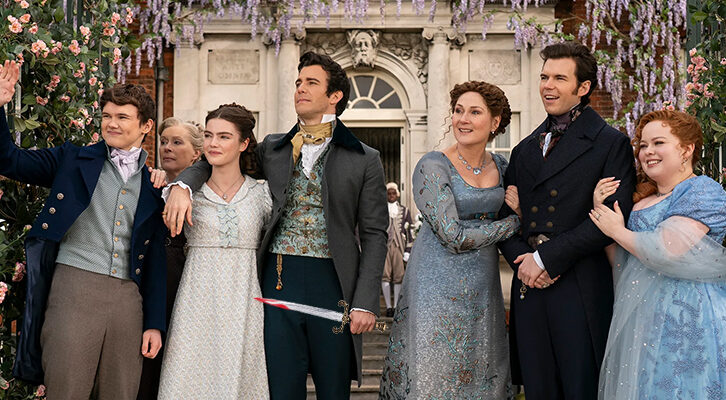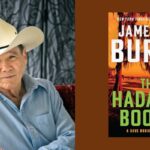
10 Classics of Campaign Literature
American Politics Has Always Been a Contact Sport
Campaign writing has a bit of sports journalism about it—from the vivid depictions of victory and defeat, to the martial perseveration on strategy, and the almost sabermetric obsession with numbers ranging from delegate counts to polling. There is a similarity between explicating the perfect Belichick or Lombardi play and the strategic machinations of a Karl Rove or David Axelrod. The best of political journalism has an appreciation for the well-executed play even if, maybe especially if, it comes from the other side. Though the questions of politics (too often dismissed as matters of mere opinion) cut to the core of the fundamental values by which we define ourselves—questions of what is fair, what is equal, what is free—the greatest accounts of campaigns and elections still offer something of the trans-ideological.
In the best election analysis, whether by Gore Vidal or William F. Buckley Jr. (whose politics are as divergent as they are obvious), there is a calculating independence that is able to read campaigns simultaneously within history but also somehow above it. This is not to embrace that old journalistic myth of “objectivity,” in a well-written work of political analysis you should know exactly where the writer stands (even if you despise their positions). Hunter S. Thompson explained it by saying, “With the possible exception of things like box scores, race results, and stock market tabulations, there is no such thing as Objective Journalism. The phrase itself is a pompous contradiction in terms.” And the adept political journalist has a bit of distrust of the politicians themselves, even the ones they are clearly voting for. A good campaign writer is always a bit of a cynic (which is just to say a wounded idealist); true believers need not apply, since polemicists and propagandists of right or left craft boring copy. The writer covering an election who really believes a candidate can restore national greatness or usher in a new era is a suspect writer. Rather look for the campaign writer who has experienced the grossness of how the bologna is made. Read the writer that is familiar with who hates whom, which staffers are sleeping with one another, what favors are owed, and where the spoils of war are going to be dished out. If after all of that the writer still believes in more noble things, than all the better.
That’s because whether in the account of the ’72 conventions by Thompson, or the ongoing broadsheets of Matt Taibbi in 2016, the most brilliant campaign writers never stop believing in the possibility of democracy and all the rest of that stuff. In any country like the United States where the stated ideals are so grand, the gulf between idealism and reality is going to be vast. As such, the best political writing must always have a bit of the quixotic about it. There should always be the sense that things aren’t quite the way they could be, and even if it’s incredibly unlikely, maybe they could be better.
The truest of American patriots must by definition always be disappointed, not because they have the wounded masculinity which pines for an imaginary lost golden age, but rather because they have the heartbreak that sees that things were never quite as promised. This is the oldest American genre—the jeremiad—which sees space within that distance between the noblest aspirations of our country, and the messy, corrupt, demagogic, bullshitty reality of what it’s actually like. So the fourth estate (insomuch as it still exists) plugs on, not in spite of but precisely because of this state of affairs. Indeed a cursory reading of accounts from previous elections demonstrate that the idealized view of a past era of conciliatory discourse between politicians is in many ways mythic.
In short, this shit has always been nasty.
But like wounded love, we keep going back, because despite our cynicism we secretly hope that this time will be different.
Far from being the most instantly dated genre, campaign writing from past elections helps us to identify cycles, patterns, and echoes over the long wave of our political history. What follows is a recommended reading list of American political writing. Representing a cross-section of ideological positions (though I am very much of the left myself), consider this a crash course in the messy, conflicted, hypocritical, idealistic, romantic, and glorious genre of American campaign writing. I’ve omitted official campaign biographies by politicians, because with the exception of Barack Obama’s Dreams of my Father (which was, after all, never intended to be a campaign book) most of them are boring, ghost-written messes destined for the discount table at Barnes & Noble (where it seems as if they’re almost asking you to shop lift them as a favor to the store).
Consider this subjective and necessarily incomplete list partial fortification for the election season ahead, for as there are patterns in campaigns across the decades, there are also singularly epoch making cycles as well. For example, our current season where the United States will possibly see either the election of the first woman to the presidency, or in her opponent the election of its last president, period.
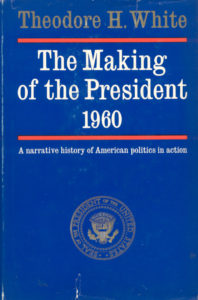
The Making of the President, 1960 by Theodore White (1961)
If Twitter is the new political medium in 2016, then it was television in 1960. Similarly, as we don’t completely understand the power of 140 characters today, observers were also flummoxed by the little black box of yesterday. If there is an enduring image from what was in many ways the first presidential campaign of the multimedia era, it was of young, handsome, photogenic, charming John F. Kennedy standing at a podium across from the slovenly, jowly, sweaty, stubled, troll-like Richard Nixon. Even if subsequent claims that, contrary to the reactions of those watching the debate on television, those who only listened to radio thought Nixon was the victor have been overstated, the enduring lesson is still one of the importance of image and appearance in an era where communication is instantaneous. Obviously there had been campaign coverage in previous cycles, but a new type of election mandated a new type of reporting, and Teddy White (who was a journalist’s journalist) obliged us of that in his dramatic narrative The Making of the President, 1960. As the NBC newscaster Sander Vanocur said of White, “Here was a print guy who understood that 1960 was the first real television campaign.” After White’s coverage, reporting on elections was no longer simply a perfunctory listing of things which happened, now the election itself was reported with all the drama and pathos of a great play.
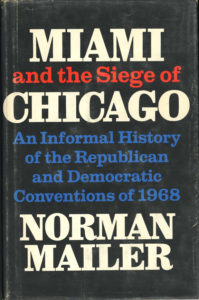
Miami and the Siege of Chicago: An Informal History of the Republican and Democratic Conventions of 1968 by Norman Mailer (1969)
Mailer of course needs no introduction, even if his reputation is perhaps more enduring than his writing. Caustic, pugilistic, at times violent, at times brilliant, Mailer was in many ways the ideal scribe for his conflicted age (even if that coveted Nobel always alluded him). Though perhaps not as influential as his masterpiece the “nonfiction novel” The Armies of the Night which chronicled an anti-Vietnam war protest at the Pentagon, Miami and the Siege of Chicago takes in many ways an equivalently dramatic event as its subject. The ’68 Democratic Convention in Chicago is rightly remembered for a series of enduring images: campus radicals in Lincoln Park draping the equestrian statue of General Logan with the Vietcong flag, the Chicago PD brutally beating and tear-gassing protestors, the late nomination of Hubert Humphrey who hadn’t run in any primaries, the shadow of Robert Kennedy’s assassination in California two months before, and with the whole convention presided over by the scowling machine politician Mayor Richard Daley. The convention expressed all of the volatile fissures in a volatile country, between liberal and conservative, left and right, and as Mailer presciently wrote at the end of his book, “we will be fighting for forty years.”
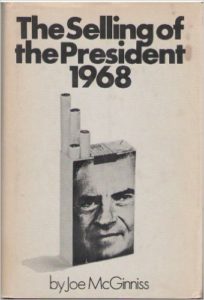
The Selling of the President 1968 by Joe McGinnis (1969)
One character looms in the New Journalistic birth of contemporary campaign writing. He appears in accounts from White, to Mailer, Robert Crouse, Hunter S. Thompson, and Joe McGinnis. A malignant presence, hunched over and grimacing, pacing at the back of the stage like some Shakespearian villain. I am writing of course about Richard Nixon, who in his rages, paranoias, bigotries, resentments, envy, addictions, and a hurt so palpable that you almost feel sympathetic for him, we’re presented with a figure who’d have been a triumph on the stage (if only we hadn’t been burdened with the unfortunate fact that he was actually our president).
Say what you will, Nixon is in many ways our most “literary” president, if by that we mean that he is one of the most relentlessly interesting as a person. Kennedy was a rich pretty-boy, Clinton a stock-southern sinner, Reagan was celluloid. But Nixon, Nixon was tragic. And that’s why, with his fulminations about an east coast establishment whose approval he craved even while he preemptively rejected them, his narcissistic tirades, his weird interactions (Elvis? Praying with Kissinger? Drunkenly talking to war protesters at 3am at the Lincoln Memorial?), he’s still so relentlessly depicted in our cultural memory. Which makes it all the more remarkable that the Nixon campaign let Philadelphia Inquirer (and avowed anti-war and left-wing) writer McGinnis such unprecedented access, where he was able to see all of the Machiavellian cynicism of Nixon’s operators up close—from the politics of racial resentment implicit in the Southern Strategy, to the spin-doctor massaging of the unlikable candidate’s persona. If White’s earlier book was The West Wing, then McGinnis’s The Selling of the President 1968 was House of Cards written with an awareness that venom goes down easy with some sugar in it.
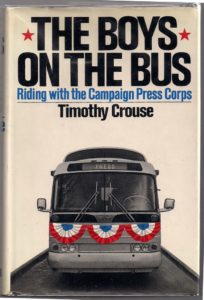
The Boys on the Bus by Robert Crouse (1973)
Before even the good Dr. Thompson, there was his colleague at Rolling Stone, the green political beat reporter and Harvard Yard schoolboy Robert Crouse, who in true New Journalistic fashion understand that sometimes the story itself is about the reporters who both craft and create the news. Though it’s still a mainstay on the syllabi of undergraduate journalism classes, The Boys on the Bus isn’t as famous as that other book about Nixon, Bob Woodward and Carl Bernstein’s All the President’s Men, even if both books were equivalently responsible for bringing reporters out of the anonymous shadows of the newsroom and into the light of American living rooms.
Nixon and George McGovern weren’t the only, or even the main, characters in Crouse’s account. Reporters like Robert Novak, R.W. “Johnny” Apple, Haynes Johnson, David Broder, Thomas Oliphant and of course Dr. Thompson himself were all as central as the candidates running for the presidency, prefiguring much of the coming Ouroboros-like nature of contemporary reporting. Lest one think that Crouse is presenting some sort of uncomplicated celebration of the chumminess of the pundit class, know that The Boys on the Bus acts as a condemnation of what he calls “pack journalism” as much as it is an explanation of it. As Crouse explains, this insularity led to “a totally abnormal world that combined the incestuousness of a New England hamlet with the giddiness of a mid-ocean gala and the physical rigors of the Long March.” We would do well to remember that then, as it is as true now. This provincialism and isolation comes at a cost for the reading public, because the reporters themselves ultimately begin to “believe the same rumors, subscribe to the same theories, and write the same stories.”
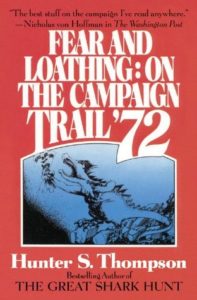
Fear and Loathing on the Campaign Trail, ’72 by Hunter S. Thompson (1973)
The good doctor in the flesh, aka Raoul Duke, aka the inventor of Gonzo journalism, aka he who “wouldn’t advocate sex, drugs or insanity for everyone” even though “they’ve always worked for me,” and for whom when the “going gets weird” the “weird turn pro.” A counterculture companion piece to his classic Fear and Loathing in Las Vegas, his account of the ’72 election presents his characteristic brew of caustic humor, jaded idealism, hilarious turns-of-phrase and almost oracular pronouncements on the state of American democracy (and the death of the American Dream). Nixon is always Moriarty to Thompson’s Holmes, but the author’s twitchy amphetamine fueled tirades about the body politic aren’t all venom and cynicism.
If there is a hero in Fear and Loathing on the Campaign Trail it’s McGovern, the dignified and decent war-hero senator from South Dakota who stands in opposition to all of Nixon’s machinations. Yet Thompson gets America’s number as well as anyone who has ever typed on a Remington—witness the flower generation’s Summer of Love, then the subsequent Hangover of Love, and finally the silent majority’s counter-revolution, he understood that “We are really just a nation of 220 million used car salesmen with all the money we need to buy guns, and no qualms at all about killing anybody else in the world who tries to make us uncomfortable.” McGovern may have been a decent man, if a less apt candidate, and though he was a solid New Deal and Great Society liberal whose policy proposals were in the mainstream of American society he was tarred by the opposition as representing “acid, amnesty, and abortion.” In the end Thompson saw that the sad truth of the ’72 election was that McGovern and his supporters ironically believed in the country too much, and that Nixon and his smarmy brain trust of glib Spiro Agnew, reptilian Pat Buchanan, and Latinate William Safire were able to mold public perception in adept ways, prefiguring so much of the continual spin and perception-massage which has become the natural law of physics in the era of the 24-hour news cycle. With our 37th chief in mind, Watergate still on the horizon, Thompson asked, “How low do you have to stoop in this country to be President?” The answer, of course, was very low indeed.
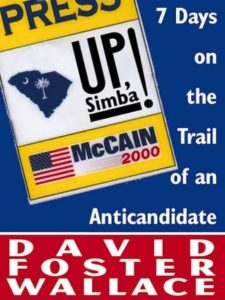
Up, Simba!: Seven Days on the Trail of an Anticandidate by David Foster Wallace (2000)
While it’s difficult to remember 16 years later, John McCain was once the embodiment of a certain primary season Republican optimism. A bona fide war hero (regardless of what a certain current Republican nominee might claim) who had broad bipartisan respect, and who launched the rare intraparty primary insurgency whose apparent rallying cry was moderation and centrism. This was McCain’s “maverick” moment of “straight talking” before his ultimately disastrous choice eight years later to put a certain Alaskan governor on his ticket, thus sinking his campaign under a deluge of bizarre inanities uttered by his running-mate.
But in that halcyon millennial year McCain seemed that rare beast, a Republican that even Democrats respected whom held the possibility of some sort of grand ideological rapprochement—maybe. Displaying a similar degree of temporal cognitive dissonance for someone reading this book today is the fact that this masterful account (which follows one week of McCain campaigning in the Palmetto State) is by none other than David Foster Wallace on assignment for Rolling Stone. Yes, that Wallace, already famous for his increasingly canonical Infinite Jest and fast on his way to being elevated as the great white hope for the Great American Novel, but before his tragic early death had enshrined him to near mythic status. Outside of the increasingly expanding coterie of Wallace enthusiasts, two popular perceptions of the writer seem to hold sway—either that he is a difficult post-modern maximalist who heaps footnotes upon footnotes, or that he is affectively a source of pithy life-advice a la his celebrated 2005 Kenyon commencement address. Whether either of these positions is totally accurate, Rolling Stone’s assignment need not be seen as that surprising.
A master of narrative journalism as displayed in essays like “Consider the Lobster” and “A Supposedly Fun Thing I’ll Never Do Again” (respectively about lobster cookery and cruise ships), McCain’s South Carolina sojourn was perfectly covered by Wallace, who despite his reputation for metafictional writing was always an intimately sincere writer who was able to convey the enthusiasm and middle American pathos of McCain’s campaign. As he put it, “who among us is so cynical that he doesn’t have some good old corny American hope way down deep in his heart, lying dormant like a spinster’s ardor, not dead but just waiting for the right guy to give it to?”
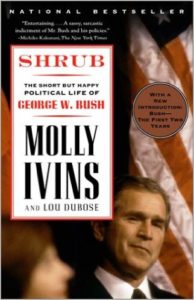
Shrub: The Short but Happy Political Life of George W. Bush by Molly Ivins (2002)
Few things are tougher than a liberal Texas woman with no tolerance for B.S., as demonstrated by Wendy Davis, Ann Richards, and of course the unsinkable Molly Ivins. From the news desks in Houston to Austin, Ivins was always a consummate regionalist who had her eye on the bigger national picture, joking that her deeply held love of the state was “a harmless perversion on her part” which she discusses “only with consenting adults.”
As this list indicates, political reporting has often been a bit of a boys club, and perhaps no beat was fratier than hard-drinkin’ Texas. Ivins could do more than keep up with the political cowboy set with her ability to deploy knife-twisting phrasing. To wit, after being attacked by Rush Limbaugh on the air she remarked that it was “an experience akin to being gummed by a newt. It doesn’t actually hurt, but it leaves you with slimy stuff on your ankle.” Reading Ivins you always get the sense that this is a woman who really knows what she is talking about, who has the intimate familiarity with the ins-and-outs of state politics and where the bodies are buried, so that you immediately trust her.
This came to great use when a certain Texas governor became President of the United States, and Ivins’ local perspective on matters took on a new national import. Infamously calling George W. Bush “Shrub,” Ivins details the former governor’s years in Austin, and the ways in which state politics molded a man who she viewed as profoundly incompetent and incurious. But Ivins understood something a lot of the Northeastern political class (where W. was from originally anyhow) didn’t comprehend; that Bush’s supposed lack of intelligence was always more of an ingenious strategy than anything else, writing “Let me say for the umpteenth time, George W. is not a stupid man.” Ivins understood how formidable Bush was while those not attuned to Texas politics sneered at his gaffs and malapropisms, proving that if all politics is local, than the local writer might understand the nation better than the Washington or New York columnist does.
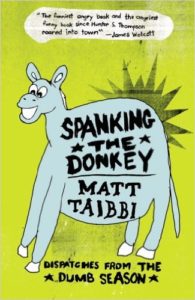
Spanking the Donkey: On the Campaign Trail with the Democrats by Matt Taibbi (2005)
If there was any controversy in identifying Rolling Stone political correspondent Matt Taibbi as the logical inheritor of Hunter S. Thompson’s legacy, than all doubts are dispelled in Spanking the Donkey when the author recounts dropping LSD, dressing up as a Viking, and then interviewing John Kerry’s education adviser. Yet reducing Taibbi as echo to his predecessor is to overlook the fact that Taibbi remains one of the single most perceptive political writers working today, and that in some ways he’s surpassed even Thompson in his ability to craft sentences that are equally shit-talking hilarious while also true.
Read any Taibbi column from our current election cycle—he enviably writes almost completely in what could be pull-quotes. For example, I refer you to a masterpiece of insult, a recent Rolling Stone article where Taibbi says that Washington Post columnist George F. Will, “increasingly seems like a man who is sure history will remember him for his heroic opposition to Trump, and not for those 40-plus years of being an insufferable spinster who writes bad columns about baseball to prove his ties to the common man.” Taibbi’s caustic wit was especially welcome during the Bush years, a period that almost until its final stretch was marked by a surreal deferential capitulation to the executive office from both the Democratic opposition and the media. That legitimate criticism of Bush was framed by the President’s defenders as tantamount to treason made the contributions of voices like Taibbi’s all the more crucial. Taibbi unfortunately didn’t see many fellow effective critical voices in the primary field of the Democratic Party, proving that old Will Roger’s adage that “I am not a member of any organized party. I am a Democrat.”
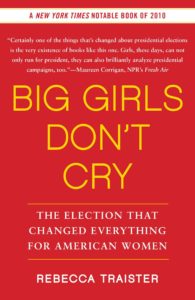
Big Girls Don’t Cry: The Election that Changed Everything for American Women by Rebecca Traister (2010)
Imagine being Hilary Clinton conceding the Democratic primary to Barack Obama in 2008, saying “Although we were not able to shatter that highest and hardest glass ceiling this time, thanks to you it has 18 million cracks in it,” heralding the unprecedented achievement of amassing the largest number of votes for a woman running for the presidency. Now envision what it must have been like to have John McCain cynically undermine that achievement by selecting a shockingly unqualified Sarah Palin as his running mate in what was interpreted as a brazen attempt to attract disaffected Hilary voters. McCain wagered and lost under the assumption that voters would interchangeably trade in their support for one woman (who had an incredible amount of political experience, including stints as Senator from New York and being one of the most widely traveled Secretaries of State) for another woman (who was incapable of naming a single national newspaper).
Covering the election for Salon, Traister was disgusted by the obvious attempted manipulations of the Republican campaign, describing Palin as someone who had clambered “over the backs, the bodies, the rights of the women on whose behalf she claimed to be working,” She writes, “I feared that Palin’s candidacy and the faux feminism in which it was wrapped would actually imperil women’s progress rather than speed it.” Adept at connecting the ways in which culture and politics collide, influence, and reinforce one another, Traister continues to write some of the most compelling political analysis today, as seen in her recent New York magazine cover article on her previous subject, Hilary Clinton (who in securing her party’s nomination eight years after losing it has achieved perhaps the greatest political comeback in half a century). In Traister’s reading, 2008 wasn’t just a turning point for seeing the election of the first black president, but also one that altered everything concerning women in politics, and setting the stage for the election season we currently find ourselves in.
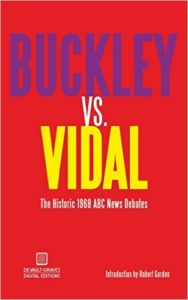
Buckley vs. Vidal: The Historic 1968 ABC News Debates by William F. Buckley and Gore Vidal (2015)
And finally, for extra credit, we return to the election cycle that created our modern political universe, and which director Robert Gordon claims in his brilliant documentary Best of Enemies birthed the current milieu of television punditry. In 1968 a struggling ABC asked two patrician writers to have a series of “debates” following convention coverage first for the Republicans in Miami, and then at the infamous Democratic convention in Chicago. On the left was Gore Vidal, fabulously wealthy author of the transgressive novel Myra Breckinridge, cousin to Jacqueline Onassis through marriage, openly and unapologetically gay, and master of the shade throwing bon mot. On the right was blue-blooded William F. Buckley Jr., a rare Catholic in the Northeastern WASPocracy, founder of the National Review (magazine of the intellectual conservative vanguard) and ultimately one of the most influential political writers of the second half of the 20th century. Both were known for their purple and mandarin diction, so that Vidal and Buckley were indeed best of enemies, in competition to see who could exhibit more charm and smarm.
The sheer hatred of the two for one another was palpably obvious, and for several nights American audiences got to hear the two argue in the aristocratic cadence of Long Island lockjaw’s dropped r’s. It was in that dignified accent that Vidal called Buckley a “pro-crypto-Nazi,” to which Buckley responded in his equally dignified accent, “Now listen, you queer, stop calling me a crypto-Nazi or I’ll sock you in the goddamn face and you’ll stay plastered.” A hell of a thing on prime-time TV, and Gordon makes a salient point about how the current infosphere of FOX News and MSNBC, with their continual haranguing and arguing, owe so much to those debates four decades ago. But maybe the more fundamental lesson isn’t that politics has become some sort of ugly business, maybe it’s the realization that it’s always been a pretty unpleasant affair.
Ed Simon
Ed Simon is the Public Humanities Special Faculty in the English Department of Carnegie Mellon University, a staff writer for Lit Hub, and the editor of Belt Magazine. His most recent book is Devil's Contract: The History of the Faustian Bargain, the first comprehensive, popular account of that subject.











